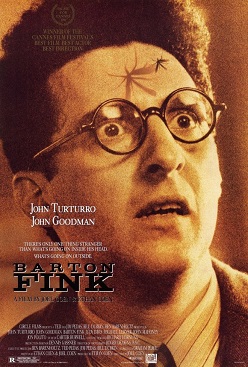The Coen brothers are nothing if not audacious, and attempting something so outrageous and anomalous as
Barton Fink at the beginning of their careers -- it was their fourth feature, after
Blood Simple (1984),
Raising Arizona (1987), and
Miller's Crossing (1990) -- shows a certain amount of courage. It's a curious melange of satire, horror movie, comedy, thriller, fantasy, and fable that had many critics singing its praises. It was their first film to receive notice from the Motion Picture Academy, earning three Oscar nominations: supporting actor Michael Lerner, art directors Dennis Gassner and Nancy Haigh, and costume designer Richard Hornung. And it was the unanimous choice for the Palme d'Or at the 1991 Cannes Film Festival; Joel Coen also won as best director and John Turturro as best actor. Evidently it took everyone by surprise. But I have to admit that although it's a provocative and unsettling movie, I don't much care for it. There's not enough of any one element in the melange to suggest to me that it's anything other than the work of a couple of extraordinarily talented writer-directors riffing on whatever comes to their minds. Barton (Turturro) is a playwright whose hit on Broadway in 1941 gets him a bid to come work in Hollywood. There, studio head Jack Lipnick (Lerner) assigns him to write a wrestling picture for Wallace Beery. Stymied in his attempt to come up with a screenplay, Barton decides to pick the brain of a famous novelist who has also come to work in Hollywood, W.P. Mayhew (John Mahoney). The playwright, the studio head, and the novelist are all caricatures of Clifford Odets, Louis B. Mayer, and William Faulkner, respectively. To my mind, this real-world reference point throws the film off center. Each caricature is well-done: What we see of Barton's play is a deft parody of the Odets-style leftist "little people" dramas like
Waiting for Lefty and
Awake and Sing! that Odets was known for. Lipnick is a rich, sentimental vulgarian with a mean streak, who like Mayer was born in Minsk. And Mayhew not only goes by the name "Bill," as Faulkner did among his friends and family, he also has a wife back home named Estelle, just as Faulkner did. Moreover, he is an alcoholic who is looked after in Hollywood by his mistress, Audrey Taylor (Judy Davis), who is clearly based on Faulkner's Hollywood mistress, Meta Carpenter. But then we have the turns into horror-fantasy when Barton tries to hole up in a Los Angeles hotel and makes friends with his next-door neighbor, an insurance salesman named Charlie Meadows (John Goodman). Good-time Charlie is later revealed to be a serial killer named Karl Mundt -- another of the Coens' in-jokes, I think: The real-life Karl Mundt was a right-wing dunce who represented South Dakota (neighbor state to the Coens' Minnesota) in Washington from 1939 to 1973. Clearly,
Barton Fink is not without a certain baroque fascination to it. It's the kind of film you can spend hours analyzing and annotating. And this makes it, for me, little more than a fabulous mess.




